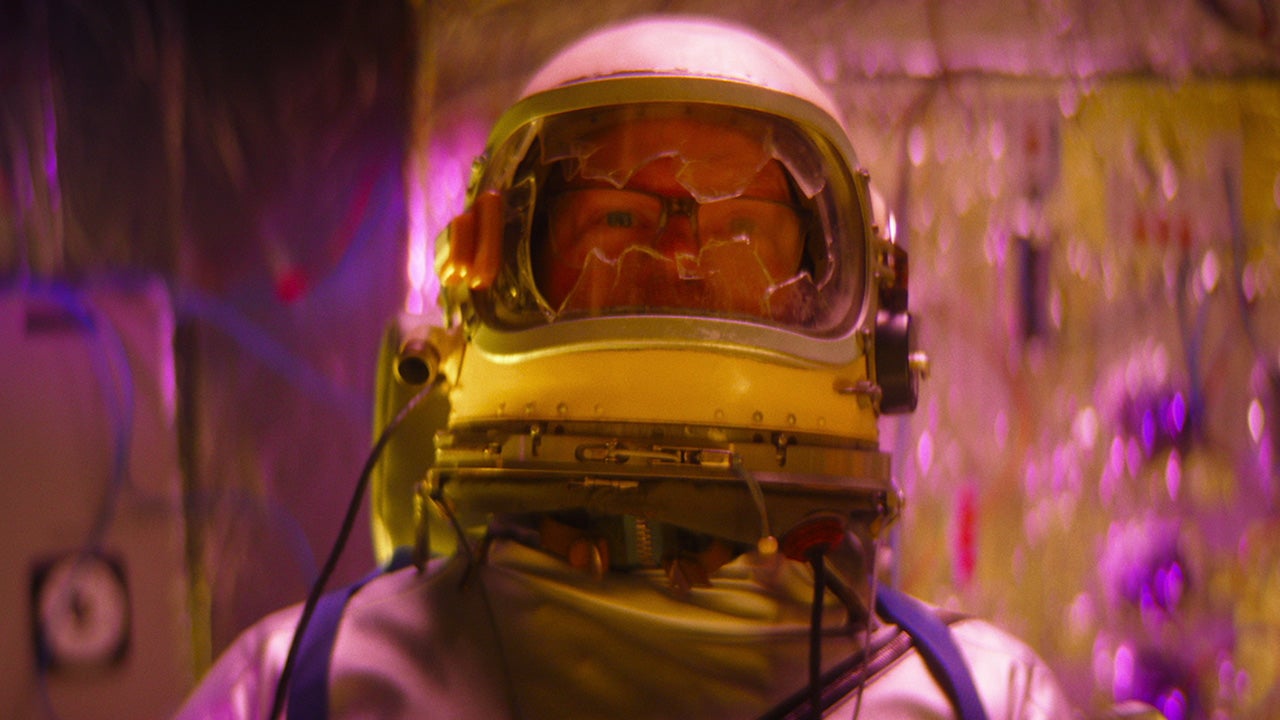If we lived in an alternate universe where Bill Nye never got his big break, relegated to shooting his lo-fi children’s show from his garage and submitting tapes to a local affiliate in hopes he’d advance to a prime Sunday morning slot, it would look something like the one Cameron Edwin (Jim Gaffigan) occupies. As his marriage is also on the brink of collapse, his midlife crisis conveniently dovetails with an old Russian rocket falling in his backyard. Edwin decides to make the most of the opportunity and attempt to fulfill his dreams of being an astronaut. An effective concoction of cosmic mystery and earnest emotion to elevate its small-scale, homespun design, Colin West’s Linoleum evolves into a nifty, heartfelt sci-drama.
Though initially drawing, liberally, from Donnie Darko, with its aerial disaster phenomenon and dreamy slow-motion introduction to a sunny high school recalling the “Head Over Heels” montage, Linoleum soon charts its own path. Rather than Richard Kelly’s foreboding tone of doom and gloom, West finds a more hopeful, grounded tenor. Falling out of frequency with his wife Erin (Rhea Seehorn), who quit co-hosting their show to move on to more promising career prospects, Edwin still maintains a connection with his daughter Nora (Katelyn Nacon) as they watch the late-night airings of his work. To further contrast where Edwin’s life has gone unfulfilled, a Dostoyevsky-ian doppelgänger in the form of former astronaut Kent Armstrong (also played by Gaffigan, in a more suave register) moves in nearby and takes over hosting his show. Even as Edwin’s mountain of personal failings and dashed dreams pile up, West’s astute script never gets too bogged down in pitying our lead character. Mark Hadley’s fanciful score and cinematographer Ed Wu’s colorful widescreen compositions exude a sense of wonder and mystery. Much of the credit must go to Gaffigan, who has impressed in Light from Light and Michael Almereyda’s recent films, but shows some of his most emotionally attuned work here, capturing a broken man in a nuanced, affecting manner.
There is also a cleverness to how West builds the pieces of his puzzle, instilling a sense of mystery to continually pull viewers in. A car falls out of the sky in the opening; then when Edwin is working, a toy version is overturned in the corner of the garage. A mysterious older woman continually shows up near his house. As Edwin continues to work on his mini-NASA project in his garage, one starts to think the narrative may zig into more cerebral, Shane Carruth-esque territory, but West smartly zags in favor of an emotional, existential wallop. It would be unfair to precisely connect dots of the narrative gamble, but it’s safe to say it’s the kind of final twist that urges a rewatch with newfound context. While this climactic grasp for the profound shows cracks in the seams with its overabundance of flashbacks and is slightly held back by the limited budget, there’s a considerable appreciation for the questions West is tackling. What defines a life and the end of one’s journey? What will be the moments of reflection that will flash before your eyes?
It’s a tricky balancing act, never dipping too treacly in getting nostalgic about life’s peaks or overdramatic in examining where it all went wrong. While some of the high school drama can feel a bit rote, as Nora’s friendship with Kent’s son Marc (Gabriel Rush) blossoms and they battle the cliché mean girl (West Duchovny), each member of the ensemble still feels grounded, which helps aid credibility when the narrative enters more fantastical terrain. A small gem with big ideas, Linoleum is a strong showcase for Gaffigan and a beautiful, bittersweet reflection on life’s regrets and achievements.
Linoleum opens in theaters on February 24.

